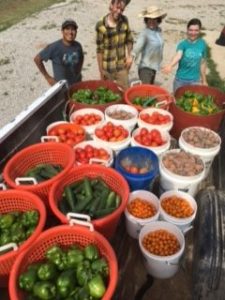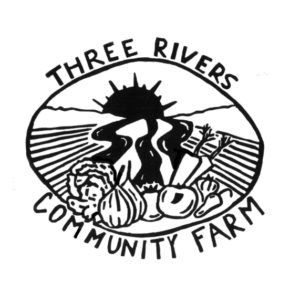Tell us a little about your farm.
We are in our 11th season this year. We are located in Elsah, IL which is about a 45 minute drive outside of St. Louis and is north of Alton on the river road. It’s a beautiful little town. We currently own 5 acres and lease 25 acres from Principia College. We sell mainly through our CSA program and we have 300 families participating in that. In addition, we go to Schlafly and Tower Grove Farmers’ Markets in St. Louis. On the farm property, we have a farm stand open to the public on Thursdays, Fridays, and Saturdays. We are organic but we don’t have the USDA certification. We grow pretty much everything but sweet corn and orchard fruit. The only fruit we grow is strawberries and blackberries. We also have a small laying flock of 70 chickens and we sell their eggs at the farm stand.
What is your background?
I grew up on a conventional corn, soybean, and dairy farm in Michigan. I saw my dad struggle farming my whole childhood and so I had no interest when I graduated high school. I went to a small liberal arts college in Michigan and ended up with an English degree and decided I wanted to work in a big city for a publishing company, but I quickly realized that wasn’t for me. I went back to school and took some environmental science courses, which is where I learned about organic vegetable farming and the CSA model. After college, I interned on organic vegetable farms on the East Coast for 3 years. After that I felt confident managing my own farm and found a position at LaVista CSA in Godfrey, IL which is what brought me to this area in 2003. I enjoyed working for the non-profit but wanting to take a leap and start my own farming business. During that time I also got married, and my husband and I wanted to start a farm together. We approached Principia College because we fell in love with Elsah and after quite a bit of convincing, they agreed to let us lease the land through a land-lease agreement. They’ve been an excellent partner and have let us do whatever we want with the land and sold us part of it to build our own structure. Two years ago, we got a loan from the Farm Services Agency to build a barn/house combination structure. The lower level is where we receive, process, and store produce with the farm stand attached. My husband, myself, and my two kids live upstairs. Its everything we hoped it would be.
What does your future in farming look like?
We want to be here for the long haul! Our CSA members are really the backbone of our operation. We have an excellent retention rate each year of 80-85% returning members and that has been vital. We couldn’t do it without those members. We prioritize them and are so grateful for their support. We’ve grown a lot as growers and feel like we offer them a great product, which is hopefully why they come back each year!
Why is local food important?
For some personal reasons, I feel very strongly that remaining physically active outside and not behind a computer all day is vital to my health. I believe that eating organic vegetables and pasture-raised meat and poultry is vital to my health and my family’s health. Beyond those personal reasons, local production offers a direct relationship with our customers and so many of them are now good friends of ours. We feel like we are providing something vital and healthy to their lives as well. Its a two way street. We both support each other.
What do you wish people knew about the food system in St. Louis?
I wish there was some magic button that we could push to make people cook more and eat more healthy food. If people just upped their game a tiny bit, it would do wonders for our business, but the trends seem to be the opposite which is discouraging. If people could just look at their routine and incorporate one meal with their family and get the ingredients from a local producer, just a small step like that would help our local food economy thrive. It doesn’t take a huge shift, just a bunch of small steps. Our CSA is one of the largest in the region but it is such a small part of the total population.
What has been your greatest struggle as a small farmer in the food industry?
For a lot of small farmers, access to land is a big struggle. We got so lucky with our location and our relationship with the college. I think having more access to upfront capital in the beginning would’ve been more helpful. I would not have been able to approach an ordinary bank for a loan for this farm. It took many years, but if we could’ve got more help earlier on, we could’ve got here much faster. We had to put every cent of our profit back into the farm in order to grow. Our main struggle now is finding labor. We are lucky to have the help we have now, but every year its dicey and we aren’t sure if we will find people to help us grow these vegetables.
How do you see your role in the community?
I think for a long time I was focused on just becoming a better grower, but now I need to be more educationally focused and trying to teach people how easy and necessary it is to cook for yourself and for your family. I try to do that a lot through our emails and social media posts. We take pictures of our dinner table and share it. I think people find it informative and inspiring. People come up with a lot of excuses for reasons not to cook but when you just get in the kitchen and do it, it isn’t that bad. I’d love to mentor young people who are interested in farming.
What is your favorite growing season/crop?
My favorite growing season is fall because it is the culmination of everything. So many great summer crops are still in season and some newer fall ones as well. Not to mention the cooler temperatures, especially here in St. Louis. My favorite crop to grow is so tough to choose. It’s usually the crop that I failed the season before because I want to have success with it and learn from what went wrong the year before.
Learn more about Three Rivers Community Farm at their Facebook page and website!



